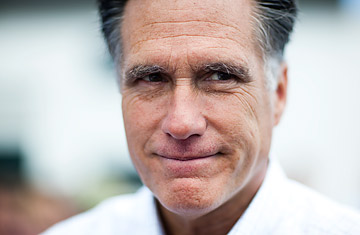
With Iowa's caucuses looming, Romney remains a second choice among many GOP faithful.
(2 of 7)
Unfortunately, all Romney's calculations, all the improvements in his stump and debate performances--all of it has left him in the same old place, uninspiring to moderates and untrustworthy to conservatives, an unloved, forlorn front runner. He maintains the support of 20% of Republicans, more or less, but the vast majority of Romney's potential supporters have suffered a series of malarial fevers and chills, warming and cooling on his opponents, desperate to find a candidate to take his place.
We are near the endgame of the Republican nominating race now. The Iowa caucuses will be held on Jan. 3, the New Hampshire primary a week later. These contests become extremely intense in their final days; it is impossible to skate through without a thorough public frisking. Romney was found wanting in the final days four years ago, after spending about $10 million in Iowa. He was then dispatched by John McCain in New Hampshire. Most experts assume he'll do better this time against a weaker field, but many of the grassroots Republicans I've talked to have the same old suspicions about him. He's too rich, too polished--he's an elitist in a party that has become home to disaffected white, working-class voters. He's a Mormon, which usually goes unspoken but is a matter of real mistrust for many Evangelical Christian voters. He's too moderate. He passed an individual-mandate health care plan in Massachusetts and favored the bank bailouts in 2008, "which takes two of our best issues against Obama off the table if he's the nominee," says one of his rivals, Rick Santorum of Pennsylvania.
But these problems pale in comparison with his brazen flip-floppery on issues large and small. Sometimes a flip is justified, as with Romney's position on ethanol. But all too often his switchbacks have been so expedient as to make you wonder how stupid, or shortsighted, he thinks the electorate is. His suddenly tough position on illegal immigration this year was a convenient way to go after Rick Perry, who he assumed would be his prime rival for the nomination, and it has come in handy again now that the surging Newt Gingrich has staked a claim for moderation on the issue. (He's also gone after Gingrich as "a career politician," another attack he used against Perry.) "Your core values are tied directly to the policy decisions that you've made," says his one moderate opponent, former governor Jon Huntsman of Utah. "When you've been on both sides--sometimes on three sides--of every issue, people begin to wonder who you really are. They simply will not elect someone they don't trust."
At a town meeting in Sioux City, just before his visit to Treynor, Romney strolled gracefully through a minefield of hard-core Republican questions without offering much red meat to the assembled carnivores. Asked about a constitutional amendment on abortion, he said he thought such issues should be left to the states. "Would you abolish the Internal Revenue Service?" He didn't say no but slid easily into a crisp outline of what he would do: reform the tax code, bringing down marginal rates, and offer tax relief for families with incomes under $200,000.
